The Weeknd, "Live For"
One of the few luxuries of aging is the liberation one receives from the self-imposed obligation to have an opinion on the controversies of the current conversation. Which is to say, not only don’t I know whether Drake is good or bad, I don’t really give a shit what my ignorance on the subject says about my knowledge of the culture. Anyway, here’s the new video from The Weeknd, in which Drake features fairly prominently. I guess if I have an opinion on him one way or another it’s that he is mostly inoffensive here, and my bigger problem with the song itself is that it lacks the menace and air of impending danger that usually make The Weeknd so appealing. I still like the sound and I guess the chorus, but I miss the “uh oh, some bad shit is about to happen” vibe. Is that Drake’s fault? I don’t care and I don’t have to. It’s a good feeling.
Is New York's Streak Of Having Mayors Who Are Braying Wisenheimers, Precedent-Shattering Racial...
Is New York’s Streak Of Having Mayors Who Are Braying Wisenheimers, Precedent-Shattering Racial Firsts, Hard-Charging Crime-Busters Or Quietly Competent Entrepreneurs Elected In The Wake Of The National Disaster Of Sept. 11 About To End?
“For the first time since 1973, when Richard Nixon was president and [Abe] Beame won office on the ill-starred slogan ‘He knows the buck’ just as New York slouched toward fiscal disaster, the nation’s largest city is poised to have a mayor who is not a braying wisenheimer, not a precedent-shattering racial first, not a hard-charging crime-buster nor a quietly competent entrepreneur elected in the wake of the national disaster of Sept. 11 but a conventional, labor-loving urban liberal of the old school made new.”
What You'll Be Listening To All December
NEW DESTROYER EP COMING IN NOVEMBER! Also: “Destroyer will embark on a solo acoustic tour in November, and tickets are selling fast. This will be your last chance to see Destroyer live until 2015!” And, as we will all more than likely be dead by 2015, it is probably your last chance at all. Forewarned is foretc’d.
Robert Taylor, 1935-2013
“Robert R. Taylor, a serial entrepreneur who popularized hand soap from a pump, gambling $12 million to prevent competitors from duplicating it, and fragrances like ‘Obsession,’ which he advertised with artful eroticism, died on Aug. 29 in Newport Beach, Calif. He was 77.”
How Are You Gonna Con People Into Paying You To Facebook Now?
“Social media managers, it could be time to find a new title.”
Poor Hank Paulson: Things Are Actually Worse Now Than Five Years Ago!
Five years ago, the economy nearly collapsed — and no one felt the impact more than Hank Paulson | http://t.co/l8ykzoDnOJ
— Businessweek (@BW) September 12, 2013
Bloomberg Businessweek goes huge today, observing, give or take, a peg for the five-year anniversary of the “financial crisis.” Oh mercy. What a tweet that is. Here is when we make a hero of Hank Paulson, the man who ping-ponged from the Pentagon to the Nixon White House to Goldman Sachs to the oversee the actual death of business as we knew it, with a in his own words biography. Which is fascinating, to be sure! It avoids the trouble of putting it in the words of reporters, who wouldn’t have an interest in how the tale is told. And so you get this, which is rather more interesting and horrifying:
So we designed a program that didn’t separate the healthy banks from the banks under duress, and we moved quickly to inject capital into hundreds of banks to recapitalize our financial system and restore confidence.
The only way we knew to do this was to put forward a program that would be attractive to the financial institutions, so they all would be encouraged to take capital for the good of the country.
There’s a real winner of an ending: “And at the end of the day, more capital is the best defense against bank failure.” I… well… uh. Banks with more money are more likely to be more bankey? Sure.
Still, at the end, Paulson agrees with most of us though! “Now a number of things that we were forced to do during this crisis made the problem worse, beginning with big banks…. When I came to Washington, Fannie or Freddie guaranteed or insured roughly half the new mortgages in America. Today about 90 percent of all new mortgages are insured by the government. So today it’s worse.” Haha. FIVE YEARS LATER: EVERYTHING IS WORSE. SORRY, MY BAD.
And the magazine has the most ridiculous graph!
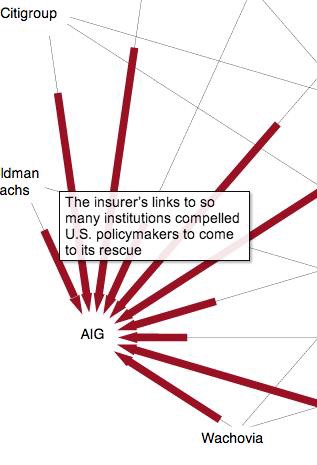
What meaningless data charting! Here, we can say it more plainly with words: Goldman Sachs would not exist today without the rescue of AIG. Put that in your chart and smoke it.
If you want a slightly more gratifying story, their Where In The World Is Dick Fuld? profile might help.
Ask Polly: I Feel Violently Ambivalent About My Boyfriend... So Should We Get Married?
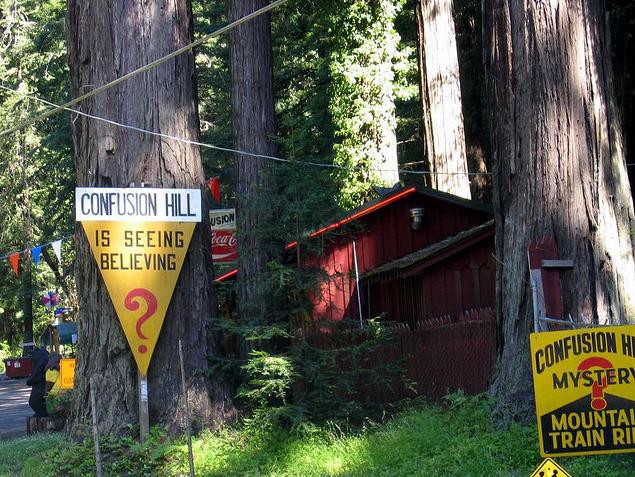
Dear Polly,
My ex and I broke up nearly a year ago, after five years together. It was mutual, yet for different reasons: he was depressed with and questioning his life choices, which our relationship was tied to (living a vagabond life, etc.). I realized that I had been questioning our relationship, and my lack of desire for him, for some time; I was finally offered a way out. I’m not sure if I would have gone through with the break-up if it wasn’t something he wanted as well. It was sad but amicable, and we remained in intermittent contact.
Several months later, he came to me and said he “chose clarity.” He wanted to get married, or get whatever-it-was-I-wanted-if-marriage-scared-me. It was out of the blue, though not entirely unexpected. But I was not in that same emotional place. I love him, but my questions about that love (i.e. Is this the type of love that I want in my life, is it the love he deserves) haven’t changed. So I said, “I don’t know.” And he said, “Okay, I’ll wait until you know.”
We weren’t sure what that waiting would look like. I told him that waiting for me was his choice, not mine, but I didn’t tell him not to wait. Finally, after a four months (of what in retrospect was probably me “stringing him along” but at the time did not feel that way), I said no.
He still wants me to fight for him. A big part of me wants to, or perhaps wants to want to.
I don’t trust myself and have been having a very difficult time accessing what it is I want and feel. I was certainly afraid to say “I don’t love you enough.” And I’m equally afraid to say “I love you enough to try to love you enough.” The questions that have paralyzed me: was this a slump before a rise, or a symptom of an unfulfilling relationship? Were our bickering and our opposing views of the world a behavioral pattern that could be worked on in therapy, or did they reflect a fundamental divide we’d never cross? There is a hardness to him that I see him working against now (for him and for me), but is it truly workable? Many times I felt mistreated in this, spoken to in a way I never want to be spoken to. I know I want someone who will allow me to experience the world the way I experience it, without philosopher-attacking me at every move, someone who will listen softly, but I also want to be challenged. We have a deep respect for each other, though sometimes there was a lack of surface, simpler respect. We have mutual life/career goals, though I don’t know yet if I want children and he probably does.
I have been of two minds about this for so long, and I’m so tired. I feel violently ambivalent: I feel thrilled about and terrified by both scenarios (a life with him and a life without him). I’ve said no to put us both out of our misery, but now am terribly frightened I’ll regret it. I appreciate the way you’ve talked about your own marriage, how you know. But what if that’s just not the case with everyone? What if, for the rest of us less lucky fools, there is no knowing ever? What if at the five-year mark in every relationship, I get bored of sex with that person, and I start questioning everything else? (Our relationship started off without intensity, but my only “intense” experiences in love have been fleeting, not sustainable.) What if all my flaws surface in the same ways in other partnerships and I just don’t know the difference of when to work on something and when to quit? What if I’m simply afraid of commitment or making choices at all? I’m trying to meditate, to be quiet around this, and calm the head-chatter and thought-loops, to get at what’s subtle. When I am able to step away from all this questioning, I feel good and self-sufficient, and confident about myself in the world when visualizing either situation.
I’m sure the way I’m writing this story out to you (thanks for a place to do so, and being you and reading letters) is very telling. Maybe I’m trying to come up with excuses for him, or maybe this is me trying to “defend my relationship in a court of law,” as you stated in an old letter, which I feel I could do. (I admit I was trying to find a letter to you that was exactly parallel to my situation so I didn’t have to write this!) I’ve had to defend my relationship to my friends who don’t think he’s “right” for me or treats me well, and defend myself to friends who love both of us and us together. And it all makes me feel exhausted. (Not to mention guilt that comes with thoughts like: There are more important things/problems in the world I could be spending this energy on.) I’d love to hear any advice on quieting the hell down, what to do, or just how to BE.
Thank you for your time!
Sincerely,
Noncommittal Nancy
Dear NN,
It sounds to me like you want to convince yourself to feel things that you don’t feel. You’re trying to come to some logical conclusion about your relationship, but logic has nothing to do with it. Your gut won’t let you move forward with him. Your thoughts are trying to override your gut, but your gut is saying “No fucking way.”
Your thoughts are telling you that no one is perfect, and leaving this man behind might be a big mistake. They’re telling you that not everyone has the luxury of holding out for True Love. But you didn’t even have intense feelings at the very start of this relationship! That alone is a big deal. You’ve already spent 5 years with someone you’re pretty wishy washy about. The only reason you’re even considering this guy is because a) you’re attached to him after all this time and b) you’ve lost sight of the fact that love can feel so much stronger and better than this — intense, exciting AND comfortable.
The amount of thinking that’s in the mix here, at the expense of feeling, is a great big red flag. You just took a page and a half to spell out your ambivalence in abstract terms. This appears to be his approach as well, based on his very clinical resolution to “choose clarity.” You listen to your head-chatter and your thought-loops, and he engages in philosopher-attacking — which, by the way, sucks. Here you are, trying to overcome an overthinker’s circular thought patterns, and everything you say is deconstructed philosophically? In my experience, that approach not only isn’t remotely helpful, it’s also not a sign of smarts so much as a sign of someone who is afraid of emotions and compulsively seeks to defuse them with a flood of theoretical nonsense.
The only whiff of emotion I can find in your letter relates to 1) the fact that there’s a hardness to him, and you don’t feel well-treated, and 2) the feeling of satisfaction you get when you’re able to step back and see the future objectively. I don’t need to ask if he’s there when you feel that way, because it’s obvious that he isn’t.
This guy doesn’t bring you peace or comfort. That doesn’t mean he’s shitty, it just means he’s not right for you. You feel confused about a future with him in part because you feel traumatized by the times he’s been careless with you. He says that he loves you, but something tells you that he also has contempt for you, so you can’t trust his love completely. You have felt attacked and not heard. On top of that, you’re bored with him sexually. Why? Because it doesn’t feel like he’s guarding your heart, or respecting who you are emotionally, underneath all of the statements of mutual respect.
I have a hunch that this boyfriend of yours is all about making statements, choosing clarity, choosing commitment, being resolute, but it never feels all that spontaneous or natural. He’s trying to lend structure to the chaos swirling around inside of him.
Fuck that. You want to be in love. You want to feel safe. You want to know that you’ve chosen the right person. And yes, if this were right, you would know it already. It’s not right.
In fact, I don’t know if I’ve ever had a stronger reaction from any “I’m on the fence about this guy” letter (that didn’t include abusive or wildly dysfunctional details). You think that you’ve just told me why you should be with him, but all you really did was leak out a flood of reasons why he feels wrong for you. That wasn’t your intention, but that’s how it came out.
Based on what you’ve written here, I see you with someone who knows he loves you at a gut level, someone who doesn’t hide behind long-winded, detached, vaguely condescending stances (that I’m willing to bet aren’t grounded in smarts so much as fear). I see you with a guy who wouldn’t dream of making you feel threatened or sad. I don’t think you have a commitment problem at all. I think you’ll be very, very good at committing to the right guy. You understand commitment. You know how to work hard. You know how to accept a reasonable number of flaws. And when you find a guy who is a little softer and sweeter and kinder to you, who loves you for your weaknesses AND your strengths (and yes, guys like that do exist), you will thank your lucky stars that you didn’t settle for your ex.
You need someone who can be still with you and appreciate the moment. You need a calming influence. You need someone who is passionate but pragmatic, loving but not overly critical.
You have lots of talent and a great big brain and you need a partner who can give you lots of love and warmth and space to grow. You don’t have that now. You have someone who takes up all of the space, who makes you jumpy and neurotic and confused and angry.
Life is way to short to settle for the wrong person. You know that if you stay with this guy, you’ll not only be settling, but you’ll also be dealing with lots of harshness and frustration and loneliness. Screw that. You should hold out for a great match. And until you find it, you can enjoy the relative solitude and thrilling independence of being alone, of finally not being held back or twisted in knots by someone who WANTS to choose clarity but isn’t there yet.
You aren’t noncommittal. Resolve not to settle for less than you deserve from now on. Set those thought-loops aside and follow your heart.
Polly
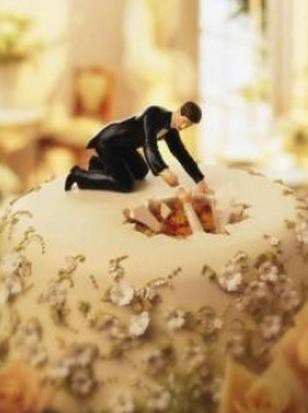
Dear Polly,
I’m not sure I love my wife, which probably means I don’t — I doubt it’s love if you have to wonder about it. (Both of us are in our mid-forties, married for twelve years.) If I could go back in time, I wouldn’t marry her. So, there’s the final nail in the question of love, I guess.
She loves me, but treats me like a punching bag. If that’s love, I don’t want to love anyone. Ferocious temper: quick to anger, slow to forgive, loath to apologize when it turns out she was in the wrong. I never know what’s going to set her off, and her explanations are hard to follow. My offenses seem minor relative to the rage they cause. I’ve just never fucked up that bad. She’s not mad because I, whatever, offered her a napkin; it’s that I interrupted her, or was about to interrupt her, or wasn’t listening, or won’t admit that I was about to interrupt, or I have a bad attitude. Other people seem to like me, so it’s hard to reconcile that with my wife’s insistence that I am a uniquely exasperating person.
Sometimes, when everything is perfect, I see the funny, caring, kind person she would be if she weren’t with me. Perfection is hard to maintain, though. A few years ago, I took a hard look at my artistic career and realized that I didn’t have the commitment, working environment, or (ahem) talent to reproduce the minor success that I’d found in my home country. So, I’m not just annoying, I’m an annoying failure.
I play the role of the thick-skinned, patient husband to the ball-of-fire wife — “Sure, she’s a handful, but you know, it’s worth it.” (The last part is secretly not true. (I also have no one to talk to about this.)) What can I do? Being treated like this hurts, and pretending it doesn’t is taking years off my life. Occasional attempts to stand up for myself have not gone well. She’s more willing than I will ever be to make scenes, miss flights, go nuclear. What I am supposed to do — put her in a headlock?
We both love where we live, and she could never afford it on her own. I pay the rent, and have managed to keep a roof over our head even when I was nearly unemployed. She is awesomely frugal and has amassed enough savings to find a place on her own, but I know it would break her heart to leave. I do a lot of my work here. It would let down my business partner and employees if I had to leave, and I couldn’t afford to keep my wife here in any case. If she left, she’d move back home and beat up on her mother the way she does me now.
We have talked about marriage counseling in the past. I’ve suggested that her anger is ruining her life too, and that she would benefit from therapy. Of course, I know it would do me good as well, but I’m not sure I could go through with it — I feel like I’m cheating just writing this.
I’ve told her before that I can’t continue, and we’ve agreed to pull the plug more than once. I’ve told her, too, that my unhappiness stems from her unwillingness to control her anger.
For my wife, it’s my behavior that’s the problem. What we need to work on, then, is identifying the things I do that annoy and upset her and stop doing those things. Having grown up in a family of alcoholics, I am very familiar with this kind of thinking (though to be clear, my wife is absolutely not addicted to anything). Anyway, she’d rather get divorced than live with someone who can’t accept her for who she is, is her answer to suggestions that she change. Maybe I should move in with her mother — in a way, we’re each other’s only ally.
Anyway, this is my problem. I’ve never been happily married (irrationally thinking that marrying my angry girlfriend would settle her down). Divorce would leave a negative net balance of happiness in the universe, since my wife’s unhappiness (and that of the people she’d take it out on) would outweigh whatever happiness I’d gain. I think sometimes I could ride out the rest of my life like this, but other times I get tied up in knots thinking, what if we’d had kids? What if we had a sex life? Is this even fair to her? If she really thinks that we have a happy, fulfilling life together, how can I take that away from her? I hate to think that she’s happy to be married to a voodoo doll to stick pins in and take her anger out on. Our problems are nothing in the scheme of things. I’m lonely, but not sure loneliness is really the worst thing in the world. Is happiness worth it? What would you do if you were me?
Could be worse
Dear CBW,
If I were you, I would find a therapist and I’d talk to that therapist about my low self-esteem, my overwhelming guilt, my inability to say no to people even when I know they’re taking advantage of me, and my habit of taking responsibility for other people as if they’re my pets or my children.
If I were you, I would probably also leave my (critical, won’t budge, doesn’t want couples’ therapy, thinks the problem is you) wife. Yes, happiness is BEYOND worth it.
It sounds to me like your wife is an overgrown child who needs to be alone in order to grow up. She doesn’t respect you because you don’t stand up to her. She is taking advantage of your weakness by controlling you and bending you completely to her will. Worrying about how she’ll fare without you is commendable, but that’s what’s kept you locked into this for too long already. You can be supportive and kind and gentle and try to split up without having it get contentious. But you should not keep yourself from leaving in a misguided attempt to protect her from the truth about herself. You’ve propped her up for long enough, and now it’s time for her to learn to stand on her own two feet. In my opinion, you’ll both be happier if you break up. From what I can tell, she’s as unhappy with you as you are with her.
So that’s what I would do: guide her gently toward an amicable split, no blame, no shouting, no nastiness. Be kind and patient with her. But insist that it’s over. Then I would slowly set about rebuilding my life. Yes, you will miss her. You will wish you weren’t alone. You’ll wonder if this decision makes you a horrible asshole. That’s just how it’ll feel. Don’t be discouraged. You are making a bold choice to give yourself the things you need, maybe for the first time ever.
You can be happy. You have to believe that. You need to rebuild your life from the ground up. You need to learn to be a different kind of a person in the world. I bet you’ll find a great little apartment that you love, and you’ll start feeling really good, unexpectedly good. I bet you’ll make some new friends and have some exciting new experiences and maybe you’ll even fall in love.
You’ve only wasted the first half of your adult life with a woman who’s been brutally harsh to you. Don’t waste the second half.
Best of luck,
Polly
Are you also wasting the first half of your adult life? Write to Polly and find out!
Heather Havrilesky (aka Polly Esther) is The Awl’s existential advice columnist. She’s also a regular contributor to The New York Times Magazine, and is the author of the memoir Disaster Preparedness (Riverhead 2011). She blogs here about scratchy pants, personality disorders, and aged cheeses.
Confusion Hill picture by Amit Patel; divorce cake photo by Wee Lakeo.
New York City, September 10, 2013

★★★ The morning was gloomy to look at, but for a while the cool redeemed it. The first-grader grudgingly admitted so. A drop or two — three, OK — fell on the way to the polls, but that was all. The gray and the pleasant temperature slowly burned off together, leaving the day’s end bright and stifling.
Ladies, Declare Victory And Go Home

“I understand that the big picture is not always reflected in women’s daily experience of life. Maybe a woman has an overbearing husband or a retrograde boss or just a lingering problem that has no name. But as a collective, it sometimes feels that women look too closely at the spot right in front of us. This is a moment, unprecedented in history — and also pretty confusing — when young women who work how they want and have sex how they want may also quilt and can fruits. When working-class women who quietly leave the only steady paycheck on the kitchen table every week may still believe that a man is the God-ordained head of the household. So I want to tell these women who are seeing only oppression: Look around.”
— I am so staying out of this one.
The Museum Of 9/11 Golf Balls, Terrorism Sweaters And World Trade Center Knives
by Alice Hines
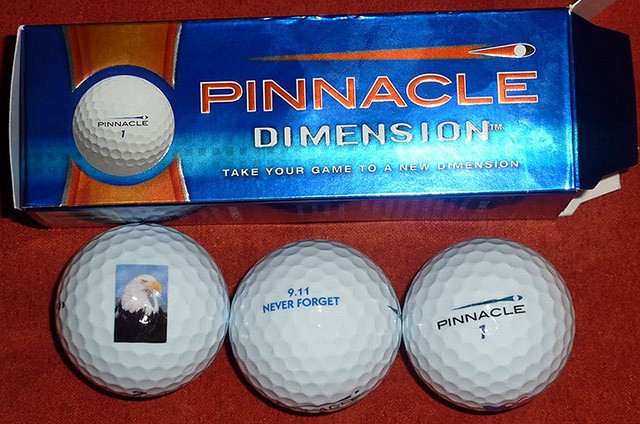
Pinnacle Anniversary Tribute Golf Balls
In most suburban homes, you wouldn’t be surprised to find an array of dusty objects — pencil sharpeners, empty milk bottles, skateboards, air fresheners and perhaps a Mr. Potato Head — tucked into corners of spare bedrooms. In Andrew Marietta’s house, in Cooperstown, New York, this stuff shares a common theme: September 11, 2001.
Marietta is the owner of one of the world’s largest private collections of September 11 memorabilia. Stored in boxes scattered around his home are 1500 to 2000 objects originally produced by companies to commemorate the event. Many of these items are strange in their ordinariness: Marietta’s collection includes not just plaques and flags but things like pens, candy and tissue boxes. Marietta is 35, and works at a nonprofit association and manages rental properties. He has been amassing these objects since 2001, when, as a museum studies graduate student, he noticed entire aisles of grocery stores and corridors of malls erupting in red, white and blue. “It was almost like 9/11 was its own brand,” he said.
Mainstream brands were behind the effort: Mars, Maker’s Mark, Hasbro, Ty Inc., Yankee Candle, and Tiffany & Co. were among the companies who produced and sold 9/11-themed versions of their regular products, often promising to donate a portion of the proceeds to charities. These days, the mass-marketing of tribute items is more controversial. In 2011, in the months leading up to 9/11’s tenth anniversary, a new deluge of commemorative products such as a bottle of Merlot priced at $19.11 were deemed “grotesque” and “exploitative.” As Stephen Colbert put it then, in a segment titled “Shopping Griefportunities”: “They hated our way of life. And what typifies our way of life more than selling each other useless crap made in China?”
While 9/11-themed silverware might not be ideal for a dinner party, it can have another use: helping people connect with a tragedy by serving as tangible proof that it actually happened. The more quotidian an object, the further it is in magnitude from the event it’s meant to conjure. That’s a distance that can be offensive — yet everyday stuff, by virtue of its ubiquity, is also more likely to trigger a memory than sacred things we unwrap only once a year.
I asked Marietta for his thoughts on tribute objects, shopping as therapy, and tracking down old beer bottles on eBay. We spoke by phone.

Alice Hines: What is the most interesting item you’ve acquired recently?
Andrew Marietta: This six pack of beer I got last week on eBay is pretty cool. It’s a brand called Fire Company Brew, made by a retired firefighter who was at the Twin Towers on 9/11. The bottles are empty because the previous owner drank the beer, but it’s basically a bottle with a fire department insignia and a label that explains the concept. There’s a whole thing about how money goes back to support a Fire Company Brew victims fund. It’s interesting to see how people started their own little businesses around the concept of 9/11.

Maker’s Mark Tribute Bottle, 2002.
Why did you start collecting this stuff?
I’m originally from Minnesota and I moved to upstate New York for a museum studies master’s program in Cooperstown. After 9/11, stuff started popping up everywhere. At first it was magazines, ephemera and flags for your cars. Some folks from the New York State Museum came to our graduate program and talked about collecting fire trucks, rubble and things like that from Ground Zero. I knew there was so much more stuff that no one was noticing. We’re surrounded by consumer goods all the time, so most people weren’t thinking about it.
These objects were unlike anything I’d ever seen before. They set a new standard of how corporate America should respond to tragedies. There’s always been this aspect of corporations saying, “We want to give back and give a portion of proceeds,” but never anything on this scale. 9/11 green-lighted this. The idea was, “Let’s take the goods that we already produce and make them patriotic.”
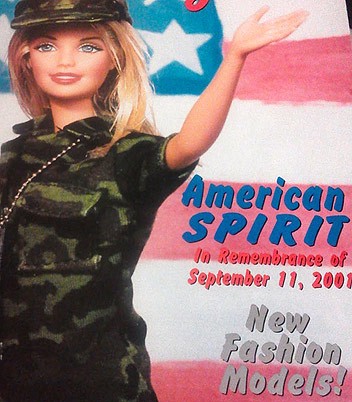
Barbie Bazaar 9/11 Tribute issue
It seems like companies were also carving out a place for themselves in the history of 9/11.
Yeah, the objects allowed the companies to put their own stamp on things. If you look at Maker’s Mark, they’re well known for that wax seal. They did a red, white and blue seal right after 9/11 in 2002. It tied that specific run of whisky to the event. When have you ever seen an [alcohol] company do something like that?
Are you at all cynical about these efforts?
I’m definitely a little bit cynical. I do think that companies were trying to give back and be patriotic. But some of the stuff is over the top. At the end of the day, companies’ true motivation was sales. I’m sure everyone was caught up in the moment, like “yeah let’s do this, this is patriotic.” And I’m sure the side conversations were “this makes us look good, people will buy this stuff and we’ll earn a bit of money.” It’s part of their culture to produce stuff and make money. I’m not faulting them for it because it’s America!
America has been a consumeristic society for a long time, though. Why didn’t anything like this happen before?
I think there definitely were some examples. You can find tribute items from the JFK assassination, but never anything like a box of cereal that commemorated it. So the question becomes, why 9/11? I think maybe it was the scale of the event and how unimaginable it was that someone could carry this out on American soil. So 9/11 and New York became this rallying point for everybody, including corporate America. You had George W. Bush saying after 9/11, “Don’t stop spending money, don’t go hide.” Corporations saw an opportunity. This was their way of playing a big role.
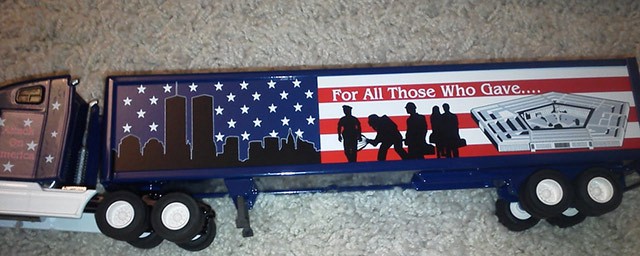
Detail, Penjoy Tribute Model Truck
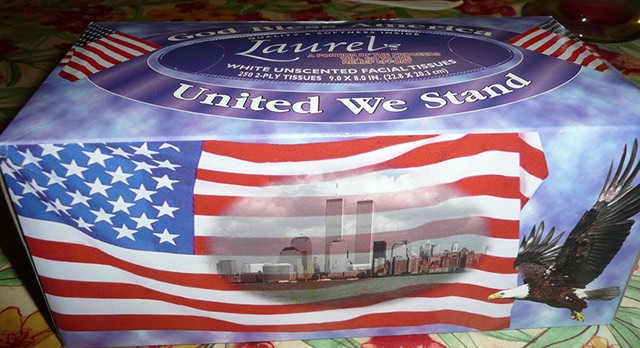
Do you distinguish between companies who donated all of their profits to charity and those who only donated some?
That’s the whole thing — it’s really difficult to because there was no accountability or tracking. Almost none of the objects I’ve collected even give a specific percent of what’s being donated. In almost all cases, it’s terminology like “a percentage of the proceeds.”
In the last couple years [the media] started talking about accountability of 9/11 charities, but no one ever considered this for products. I’m not saying that companies never wrote the checks, but we also don’t know how much money they generated that they didn’t donate. I don’t know if we’ll ever know.
Why do you think people bought the objects?
Buying things made people feel better. It’s such a part of American culture. It’s also the fact that money is being donated. But it’s also self-gratification and because people wanted to have a direct connection with the event. A guy in Iowa can’t touch a firetruck or even see it without coming to New York and going to the State Museum. But he can buy a belt buckle made in commemoration of 9/11 at the Iowa County Fair. It’s his way of touching the event.

But it’s not just a direct connection to 9/11 that people are buying with these objects, right? It’s also the idea of owning a piece of history. If you only wanted to feel connected, you could donate or volunteer.
Yeah, people could have made the choice to directly donate to a charity. But they also wanted to have a piece of the event. What do you get from donating to United Way in New York City? The benefit of knowing they’re making a difference, but nothing tangible. But if you go and buy that Mr. Potato Head, you get an object you can touch and feel which is also tied to September 11.
The thing I think is interesting is that many of these objects are so quotidian. Like the tissue box, for example. It encourages you to integrate memories of 9/11 into your everyday life.
Yeah, absolutely. I have a milk bottle from a family farm that you would never expect to have a tribute message about 9/11 on it. Or I have a silverware set that has the Twin Towers on the handles. The question is, would you really buy this and eat with it? That 9/11 throw pillow — are you really going to put it on the couch? I would love to know what the companies thought. I think they intended this stuff to be used, but I don’t think people are actually using it.
I have one scenario in my head where they thought people would actually break this stuff out every year on 9/11. It’s almost like they thought 9/11 would be the next Valentine’s Day or Halloween.
Or at least Memorial Day or Veterans Day.
Right, or the next Fourth of July. I’m not saying it won’t happen, but so far I don’t think the material goods have stuck.
Your first post on your blog was about a lighter you found in Dubai that shows the Twin Towers being hit by a plane, with a bust of Osama bin Laden in the foreground. What’s the story behind that?
The lighter shows the other side of things, how 9/11 influenced material goods elsewhere and how the event has different meanings to some people. My parents lived in the United Arab Emirates for 10 years while I was in college. I bought the lighter from a street vendor in Dubai. My dad was pissed, he thought it was offensive and upsetting. I bought it and flew it back in my luggage, which is crazy now thinking about it.
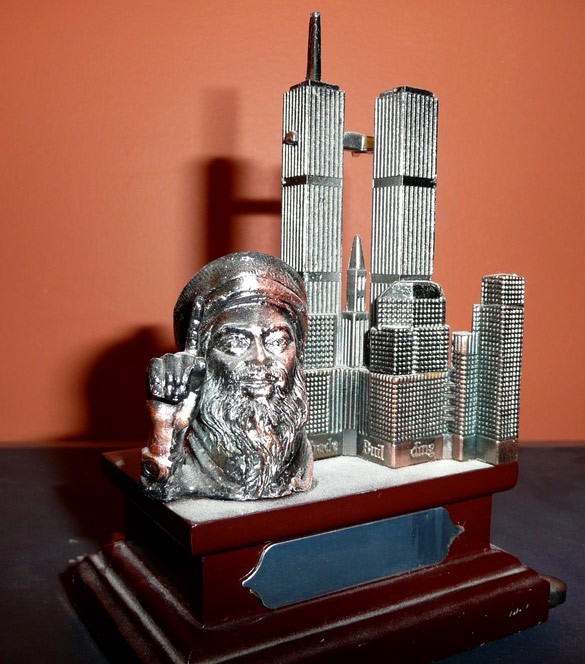
Lighter procured in Dubai in 2002: “Two flames are given off the top of the figure’s head when a side lever is pulled.”
Where do you buy most of your items?
A lot of it is on eBay. In the beginning, you could find stuff in stores, but now that we’re more than 10 years out it’s getting harder. I just acquired a new item on eBay, a knife from Spyderco, which is a company based in Colorado. They made a limited run shortly after 9/11, 2000-some knives using steel from the World Trade Center site.

Spyderco World Trade Center Fundraising Knife Project: Knife with WTC steel and Presentation Box.
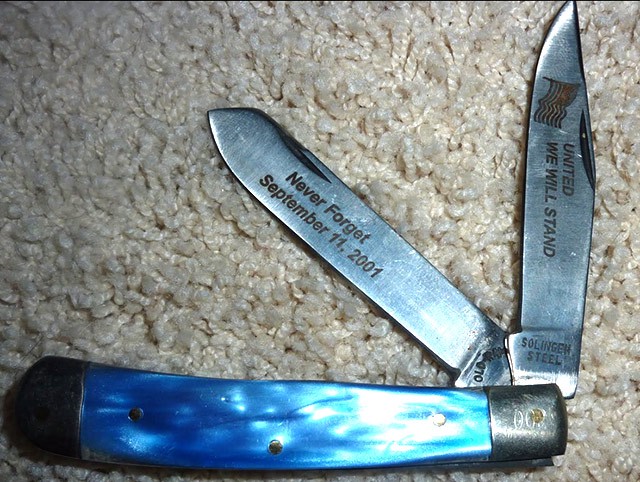
How much did you pay for the knife?
$425. It’s not a huge amount of money but they usually go for $700, $800, $900. It was a great deal so I couldn’t pass it up. Another object I picked up recently was a game. There is actually a board game called “Ground Zero: It’s Only a Game to the Politicians.” A New York City-based guy, a former firefighter, made it and sunk a whole bunch of his own money into producing it. It’s a cynical thing.
Do you have any plans for your collection in the long-term? What are you going to do with all this stuff?
I don’t know. I’m not opening my own museum, that’s for sure. I’ve recently made this connection with the curators of the 9/11 museum. I don’t know if they would ever take my collection. Some of it is dicey and would upset people. I can tell you though, that if something were to happen to me my wife would reach out to them and see if they wanted it.
How much time do you spend on the collection?
I waste a lot of time and a lot of money. [Laughs] I don’t see it as a waste, though I would never deny that a lot of people see it as a complete waste of time and energy. I’m not going to fight that perspective.
My wife tells me all the time she thinks it’s a bunch of crap. She hasn’t tried to kill me yet over it, though. She came with me to a meeting with the curator [of the 9/11 museum] earlier this year in New York City.
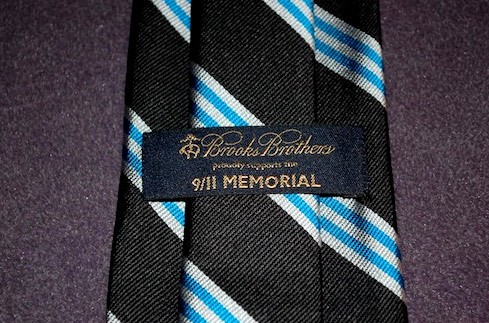
Brooks Brothers 9/11 Memorial Tie
Wouldn’t other people learn more from the collection if it were stored more publicly?
This is definitely a motivating factor to make it more accessible. I’ve had a few people find my blog and reach out to me. Most of it is kind of funny stuff; some lady wrote a comment about this crazy sweater I have which says “Terrorists can shake our buildings but never can touch America’s foundation.” It’s a hokey sweater. She said, “I’ve got to have this sweater! Where did you get this sweater?” Once, a candle company found my blog and sent me their tribute air fresheners, which they called “Freedom fresheners.”
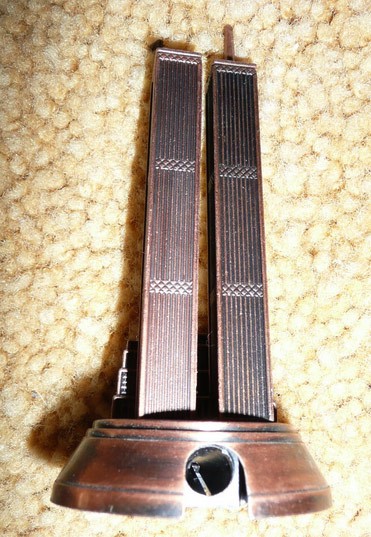
Are there other collectors of 9/11 memorabilia around?
Not really. There is a guy named Michael Ragsdale who collects paper ephemera, a lot of autographs and PR stuff, which is different from what I have. When I found him and reached out to him, he was like, “This is great, I didn’t know there was anyone else out there.”
You wrote on your blog that your own experience of amassing this collection is consumeristic. How is your relationship to these objects similar or different than those of their original owners?
I look at it as an ironic thing. This stuff was sold so people could buy it; now it’s out there again and I’m collecting it. I’m doing the same thing that was originally intended for these objects. So it’s similar, but our motivations are different. Originally, people wanted to connect with 9/11 by having a physical piece of it. For me, it was not necessarily about feeling a connection to the event but because I recognized that these objects were unique. I knew that if I didn’t save them they would get thrown away and 20 years later people wouldn’t remember the full impact.
So you collected them for historical significance.
Yes, that’s right.

“Terrorists Can Shake Our Buildings…” Sweater. See also: Ralph Lauren Polo Tribute Sweater.
Alice Hines is a freelance writer in Brooklyn. You can find her on Twitter: @alicehines. Photographs courtesy of Andrew Marietta. This interview has been lightly edited.
